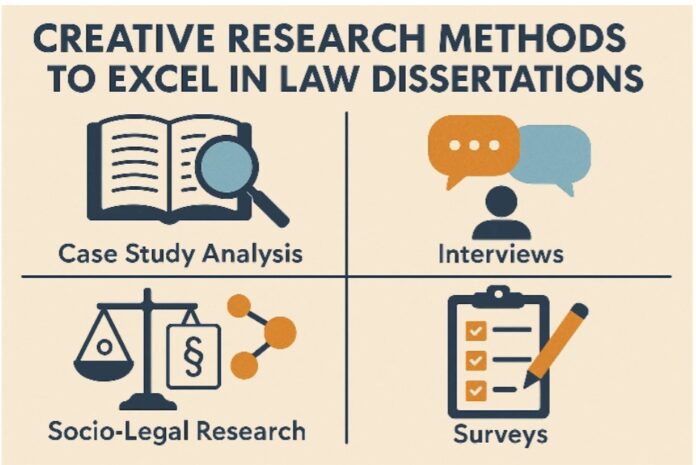It can be a complex task to write a law thesis, especially when it comes to choosing the correct research method. Innovative analysis strategies not only enable you to find unique insights but also make your work impactful. With the help of these creative methods, you can build a strong argument and display evidence in a more convincing way.
To ensure the authenticity of your work, you can use tools like a free plagiarism checker UK. Yet, these techniques also encourage your critical analysis and originality. This guide will enable you to know various research methods that are best suited for a law thesis. Also, it will explore how creative methods can improve your legal research.
How Creative Methodologies Can Strengthen Your Legal Research?
As you are aware that there are various ways in which innovative methods can enhance your legal study. Here is a list cited:
- Stimulates New Ideas: These innovative techniques prompt you to approach legal issues differently. Thus, results in more original and reflective thought.
- Connects Theory to Practice: These methods also provide you an chance to link legal disciplines to a case, thereby enhances the relevance and pertinence of your research.
- Enhances Problem Solving: These creative methods will narratively lead you to more strong solutions to complex legal issues.
- Deepens Your Data: The mixture of methods will submit you richer data & more effective findings.
- Flushes Out Research: Creative methods will ensure your thesis reads more interestingly and help distinguish you from your classmates.
Now, it’s time to explore diverse research methods that are best suited for a law project.
Know Various Research Methods That are Best Suited For a Law Dissertation
You might know that every law thesis requires an analysis technique that suits the topics and goal of the study. Moreover, some of the topics work better with data and surveys, whereas others need legal interpretation and comparison. With the help of different research methods, you can choose the one that best matches your question. Further, these options aid you in planning your study and organising your data. Below are diverse analysis techniques that are best suited for a law thesis.
Empirical Analysis
Empirical analysis is one of the strategy of analysis. It involves gathering real-world data to understand how the law works in practice. This technique depends on findings such as surveys, stats, interviews and case records. Moreover, it enables you to study the real influence of legal systems and understand where the law gets its purpose. Hence, it makes you work more practically and aids you in showing how legal decisions affect people and society.
Comparative Study
This type of method looks at how diverse countries manage the same issues. The comparative study helps you recognise what works best and what can be improved in each system. Moreover, it is valuable because it provides a point of view; you can see how culture and society affect legal results. In case you need extra assistance in understanding this concept, do not hesitate to get aid from a service like Assignment Desk.
Case Study Method
Another method is known as the case study method. It basically relies on one of a few legal cases to understand broader issues. In this, you need to look deeply into the facts, legal arguments, and results of those cases. This method aids you in recognising how legal theories are applied in real-world situations. It refers to one of the best ways to show your understanding and critical thinking. Yet, if you face any issues in managing your coursework, you can ask experts, “Can you pay someone to do my online exam?”
Doctrinal Research
Doctrinal research is one of the oldest and most commonly used approaches to legal research. Doctrinal research studies legal rules and principles as well as court decisions based on statutes, case law, and comments of legal scholars. While traditional in nature, doctrinal research is still significant since it assesses the bedrock of legal studies, providing clarity on its contents and interpretations at particular historical points.
Socio-Legal Approach
The socio-legal approach analyses how law interacts with and affects society. In contrast to training legal scholars and educators to examine solely written law, the socio-legal approach examines people’s navigation of and adherence to law as they encounter it in the world at large. There are often real-world observations made using interviews, observations, and surveys to better understand behaviour, which often demonstrates the disconnect between legal requirements and reality.
Interdisciplinary Method
The interdisciplinary approach merges the law with another discipline, like economics, sociology, psychology, or politics. That is, the interdisciplinary approach helps you analyse how legal problems relate to broader social or economic problems. The interdisciplinary approach broadens, deepens, and sometimes reorients your project to present the relationships between legal problems and another discipline.
Critical Legal Analysis
It is another type of research method, which is known as critical legal analysis. It challenges traditional legal views and asks in-depth queries about fairness and justice. This method explores how laws reflect political and gender-based biases. Also, it encourages independent thinking and enables you to question presumptions behind legal rules. Yet, if you still find yourself stuck with any issue, you can get an assignment helper for guidance.
Narrative Inquiry
Narrative inquiry emphasises the unique and valuable use of storytelling to investigate experiences of law and understanding of law. It requires the examination of stories about individuals or group experiences concerning the law. This approach contributes to the personal and emotional dimension of your work, allowing you to integrate a human quality into your work, which is helpful as it relates to thematic studies in areas such as human rights, family law, or social justice.
Final Thoughts
In brief, with the help of the proper research method, you can write a successful law thesis. At the same time, the strategy you pick shapes your evidence, analysis and conclusion. It’s also best to select an approach you feel comfortable with and is fairly well-aligned with your topic. A thoroughly researched thesis will simply lead to a better mark while also giving some insight of practical value to the field of law. If you are uncertain about whether anything in your work is not sufficiently original, you could always get aid from a free plagiarism checker UK.

